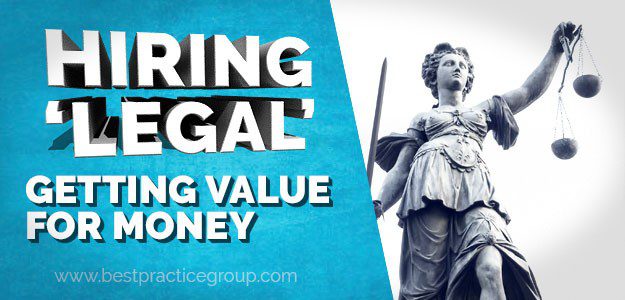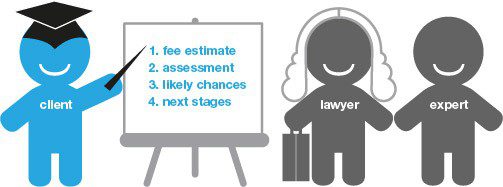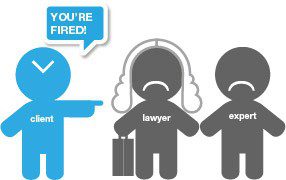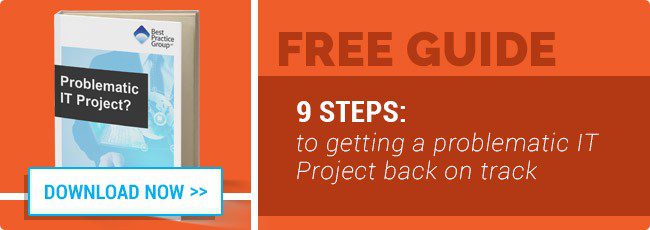
When it comes to hiring ‘legal’ it usually means things are starting to, or already have, gone awry. So when hiring an IT lawyer or technical expert, you need to be clear about your objectives and outcomes from the beginning. We’ve supported many clients when they have decided they would prefer independent help to get an errant IT project back on track. In dealing with over 500 problematic vendor relationships, we’ve seen that the recovery process can often be made more difficult than it needs to be, with insufficient focus on the right priorities. In our experience, focusing on the wrong priorities and responsibilities is the biggest cause of being unable to get a complex IT project back on track.
Adopting the wrong process in recovering a major IT project can completely undermine your contractual position. Even if your vendor’s failures are causing your project and organisation irreparable harm, you are likely to:
-
(a) fail to get the project back on track, and
-
(b) undermine your case if you do have to terminate the project early, if you haven’t focused on the right evidence
or don’t follow the right escalation process or legal procedure.
Taking the wrong contractual approach to recovering the project usually means the vendor can claim financial damages. It is therefore vital to choose the right lawyer and technical expert, instruct them properly and manage their output, so you get the right advice to get the project back on track and achieve a fit-for-purpose system implementation.
Why hire an IT lawyer or technical expert?
There are several reasons for hiring a specialist IT lawyer and technical expert, even if you already have legal, procurement, contract management and technical expertise within your organisation.

In particular:
-
Your contractual position is usually more complex than anticipated, as most agreements contain detailed fit-for-purpose aspects that enable you (or should enable you) to achieve your business outcomes.
-
An IT lawyer or technical expert with extensive experience of how a vendor’s expert responsibilities apply to your IT project implementation can help you to understand these responsibilities and advise where they have been breached. This gives you more leverage to encourage the vendor to get its act together.
-
There could be several causes of the problems you’re experiencing. Your lawyer and technical expert can help you to ascertain who has materially contributed to the difficulties, and for which issues.
-
Your vendor may question your internal research into the implementation difficulties. Independent validation of your evidence helps to counter the vendor’s arguments.
-
Your lawyer or expert can help you to deal with contentious issues that you may be uncomfortable handling yourself. They can prioritise and align your discussions with your vendor, so you don’t end up in a worse contractual position.
-
Your lawyer or expert can support you in your negotiations with your vendor. Your vendor will have been through many more implementations than you and may therefore have significantly more experience of how to negotiate in these situations.
Why wouldn’t you hire a lawyer or technical expert?
There are several reasons for not hiring a lawyer or technical expert. They can be expensive and give you poor value for money if not managed correctly. Specialist solicitors and barristers may understand the contractual issues but often lack the practical and technical experience of implementing an IT project. You can therefore end up paying to teach them things you think they should already know. This is where a combined legal and technical expert team can really help keep you focused and achieve your business outcomes. External advisors are not as ‘connected’ with the implementation problems as you are. As a result, you may feel there is a lack of empathy from them for your situation. In most circumstances this objectivity is a good thing, but it won’t make you feel any better.
Finally, if your lawyer or expert doesn’t have the right combination of business understanding of your sector and organisation, technical, contractual, negotiation and facilitation skills, it can result in you burning your bridges with your vendor, making the recovery process far more protracted and expensive.
What should you look for in a specialist lawyer or technical expert?
Before hiring, check that your lawyer or technical expert has the following characteristics:
Actual management experience of complex IT vendor relationships. This is rare for lawyers but much more common for technical experts.
Expertise in IT project implementation.
Contractual expertise in your specific type of vendor relationship. Specialist lawyers are usually good at this but may not understand the consequences of some of the more technical aspects of your vendor relationship. Teaming up your lawyers with appropriate technical experts increases your chance of achieving your business outcomes.
Recommendations from clients that have undertaken similar recoveries of IT projects and who understand your situation. Complex IT vendor relationships have nuances that aren’t present in other vendor relationships.
An interest in the matter you want to discuss. Do they really understand your expected business outcomes from the implementation and how to align the recovery process to meet them?
Instructing your IT lawyer or experts
When you instruct your lawyer or expert, you should always agree in advance a fee arrangement for the specific work you need them to undertake. You can decide the work you need them to do by going through the following stages:

1. Review documentation yourself and put together an executive summary of the background to the dispute. This should include key dates, documents, the issues that have arisen and your objective in getting the project back on track. Schedule the documentation in chronological order, so it’s easier for the reviewer to assess the issues.
2. Put together a terms of reference, outlining the information you want your advisor to provide you with or issues you would like further clarification of, as a result of reviewing the issues.
3. Provide your executive summary and supporting documentation to your lawyer or expert and ask for an estimate for reviewing the documentation and conducting interviews with key stakeholders.You are looking for early visibility of the strengths and weaknesses of the case for getting the implementation back on track, along with your options, counter- arguments and so forth, based on the information you have provided.
4. Tell them they can caveat the advice based on the information you’ve provided and that if they identify any additional documentation that they need to review, then that will be subject to a further review if necessary. In the meantime, ensure they only review what you have provided to them and that they build in time to ask questions to clarify any issues in the documentation.
5. Be specific about the format of the output, whether it is a written report, verbal report, a workshop with slides or a combination of all three. Note that because of the early stages of understanding, reports at this stage are usually very expensive to produce (often as much as the cost of the investigation itself) and are of limited value to you, because of the caveats that need to be included. Although this approach may sound a little counter-intuitive, it will result in much better value for you and much earlier visibility of any issues or evidence that work against you. Lawyers and experts usually resist giving you this sort of ‘first pass’ overview of where you stand, because they prefer to know everything before giving you advice. But you don’t want to spend significant sums on advice when the first pass shows you have a weak chance of a positive outcome. You need to know whether there is anything worth fighting for and if so, whether there is any material evidence that supports that outcome. If it does look as though you have a realistic way to progress, then you can stage the review and advisory work so that the lawyer or expert can advise you on a step-by-step basis and give you solid conclusions (and an understanding of their costs) before moving onto the next stage. Operating this process at each stage can be more effort for you, but you will significantly reduce your costs, usually have matters settled much faster and avoid misunderstandings with your advisors.
Limiting your costs

You can significantly reduce your fees by using specialist external advisers that are practically experienced in both the contractual and technical side of IT projects, rather than using general practitioners. While a specialist lawyer and technical expert’s day rates are likely to be higher than a general practitioner, they will usually achieve a fit-for-purpose outcome in a significantly shorter time, resulting in a much lower overall fee. Their work will be highly focused on your business objectives and keeping you within budget.
You can also save money by doing some of the work yourself. For example, you can:
-
Do the legwork of gathering evidence, creating technical schedules and so forth. Your lawyer or expert can provide you with forms and output documents that are constructed in the way they need, so you can populate them.
-
Review documentation and determine which is pertinent before you instruct your advisors, although this may be a false economy unless you have a very good understanding of contract law, technical issues and specialist vendor’s expert obligations. If you move on to look at further evidence after a preliminary assessment of your vendor relationship, then it is very important that your external advisor has all of the documentation, in case something arises that they were not aware of.
-
Represent yourself during meetings with your vendor. You can instruct your advisor as a ‘shadow’ lawyer/expert, so your vendor is not aware of their involvement. You negotiate directly with the vendor to get your deliverables and implementation process agreed, but with the benefit of specific advice and highly focused evidence, designed to get you to a fit-for-purpose implementation.
Firing your lawyer or expert
If you’ve followed the process outlined earlier, you are unlikely to have any serious problems with your advisor’s output or costs. However, you might disagree with their advice. This is not uncommon in recovery and dispute situations. Clients can believe that they have a good case but the advisor interprets the facts differently. If you simply disagree with the advice or you believe your advisor does not have enough empathy for your situation, then you can fire them, but you’ll need to pay their fees and disbursements to date.

If you believe their advice is wrong, then you have a couple of options:
1. You can explain why you believe their advice is incorrect, and your advisor can set out how he or she formed that view. During these discussions, you might find that a key piece of documentation was not provided or an interview with a key stakeholder was missed. Your advisor can then address this.
2. If you don’t make progress, you can instruct another advisor for a second opinion. If the opinions differ significantly, then you have to decide whether to believe the first or second opinion and whether you want to withhold payment from the original advisor.
If you believe your advisor is not acting in your best interests or that their advice is wrong, and you have tried approaching the advisor without any resolution, then you can contact the following:
-
Solicitors – the Solicitors Regulation Authority Contact Centre. Telephone : 0870 606 2555 or email: contactcentre@sra.org.uk
-
Barristers – Contact the Legal Ombudsman. Telephone: 0300 555 1777. Email: enquiries@legalombudsman.org.uk. Or through its website: www.legalombudsman.org.uk
-
Experts – this depends on the type of expert you have instructed. In non IT situations and disputes, such as a medical professional, civil engineering professional or accountant, you can contact their professional body. These bodies can usually prevent errant members from practising again or invoke significant disciplinary action against them. However, in IT, despite there being a number of associations, none of them have the ‘teeth’ to invoke disciplinary action that stops errant advisors from practising.
Summary
-
Teaming up with the right lawyer and technical expert can add considerable value by keeping the focus of your evidence right, speeding up the process and minimising all costs (including their own).
-
They will help you to avoid mistakes that will undermine your position and give you the support and independent perspective you need to successfully you’re your implementation back on track and protect you at the same time.
-
However, you must manage the process carefully to get the right outcomes and to keep your costs down.

